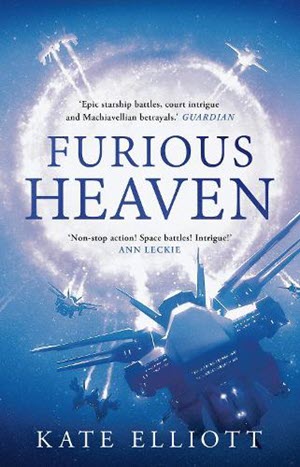Furious Heaven
 You can tell when I am fascinated by a book (or series), because, in addition to buying them in hardcover, I buy the ebooks because they are searchable, which makes it easier to check up on the various clever things the author has done.
You can tell when I am fascinated by a book (or series), because, in addition to buying them in hardcover, I buy the ebooks because they are searchable, which makes it easier to check up on the various clever things the author has done.
As you probably know, the Sun Chronicles are a gender-swapped space opera version of the life of Alexander the Great. I am, inevitably, suckered. Having now read two books, I think I have a handle on the shape of the series. Unconquerable Sun introduced us to Sun, her world and the people around her. This book, Furious Heaven, tells of her conquest of the book-world version of the Persian Empire. Book three will presumably tell of her death. More of that later.
If you know anything about Alexander then you will know that, sooner or later, Sun’s mother, Queen-Marshall Eirene, will be assassinated. Once that happens, all hell breaks loose, because Alexander’s attack on the Persians is the original Blitzkrieg.
In addition to the assassination, Furious Heaven gives us the Battle of Issus, where Alexander captures Darius’s family. There’s a sort of equivalent to the sieges of Tyre and Gaza in that Sun conquers a mercantile empire, and then we are on to Egypt where Alexander gets proclaimed Pharaoh and goes into the wilderness to learn ancient wisdom. Finally we get the Battle of Gaugamela where Darius is once more routed, leaving Alexander free to take Babylon.
Of course all of these things have to be adapted for the book world. I was particularly interested by the mercantile empire which is based on Argosies – giant space ships with hyperspace bubble drives that are able to tow chains of smaller ships behind them. An argosy, as the term is used in Shakespeare, is a fleet of merchant ships all sailing under the same flag.
Another interesting deviation is that the book world version of the Persians, the Phene, do not have a king. They are ruled by a Council of Riders who are strange beings able to communicate with each other over vast distances, and who have a second face and personality on the backs of their heads. The Riders give the Phene a significant military advantage thanks to their communication ability. This they signally fail to use, because like the Persians they spend way too much time arguing amongst themselves, and arrogantly assume that an upstart like Sun doesn’t stand a chance against them.
While I admire the way that Kate Elliott has translated Alexander’s story to space opera, I’m actually more interested in the deviations because that leaves her room to change things. As I noted above, book three should end with Sun dying, but it doesn’t have to. There are things in the books that were very much not relevant to Alexander or his times.
Most significantly, the world of the books is somehow descended from the Celestial Empire, which was originally based on Earth. At some point in the very distant past, humankind fled into space in giant arks. There was a planet called Landfall. And then more settlement. There were the kunnu drives, used by the Argosies. Then the more modern beacon drives (wormhole gateways). And then a civilizational collapse in which many of the beacons were destroyed and the secrets of their manufacture lost.
One of the plot lines driving the series is the desire of Sun, and more specifically Persephone, to rediscover the secrets of the beacons. That sounds like something that can’t happen if Sun dies and her Companions wage civil war against each other, as ought to happen if we are following history.
Talking of beacons, I have also been intrigued by the way that Elliott manages war in space. It is way better than the silliness we get in Star Trek where fleets of ships face off against each other as if they were armies of Napoleonic infantry firing volleys at each other. It is perhaps a little off on the tactical side because it is too much like Second World War naval engagements. Space battles happen way faster, and at vastly greater distances. But the strategic side of only being able to go where beacons (or kunnu drives) let you go, is spot on.
One of the effects of this is that battles take much longer. You have to move between beacons under torch drives (impulse engines). In Alexander’s time battles were over in a day, but the greater time in the book gives Elliott plenty of opportunity to develop the plot while the battle is raging.
The other major element that isn’t drawn from history is the existence of Riders. That plot too will need to be resolved, and if you have been paying attention you’ll know that it is all bound up with Persephone and the beacons. There’s a reason why Elliott has named Perse after a goddess of the underworld.
I said in my review of Unconquerable Sun that I was keen to see the book equivalent of Bagoas. That role appears to have been given to Jin-Na, the dancer from Idol Faire. She does have a girlfriend, but she’s not exactly an iconically queer character. On the other hand, we have Bartholomew, whom I confidently predict will marry Sun early in the next book.
For the next book, I want to know what happens to Petal.
I think I have been rambling, because there is just way too much to think about in these books. I love them.

Title: Furious Heaven
By: Kate Elliott
Publisher: Head of Zeus
Purchase links:
Amazon UK
Amazon US
Bookshop.org UK
See here for information about buying books though Salon Futura